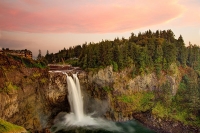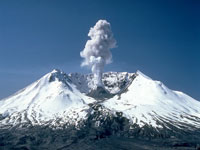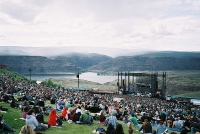City guides


Cascade Mountain Range Travel Guide
Known locally as the Cascades, the Cascade Mountain Range is a breathtaking range of peaks that extends from the northern tip of California into southern British Columbia. The mountains are a veritable paradise for outdoor sports such as hiking, rock climbing, skiing, camping, boating and canoeing.
The tallest peak in the Cascades is Mount Rainier, which stretches up 14,411 feet (4,392m) above sea level. While climbing Mount Rainier is considered very difficult, the peak offers other activities and is one of the most-photographed mountains in the US. Mount Adams is another peak that is intimidating to novice climbers.
But perhaps the most famous peak in the Cascades is Mount St Helens, an active volcano that famously erupted in 1980, killing 57 people. The Mount St Helens National Volcanic Monument explores the event. Only a few hours' drive from Seattle, the Cascades are a wonderful place to relax and enjoy nature on any Washington holiday. The pristine wilderness and abundant animal life will rejuvenate anyone who needs to escape the city.
Things to do in Cascade Mountain Range
A visit to the Cascades Mountain Range is a great way to enjoy Washington at its most rustic and scenic. The range is divided roughly into three regions of forested mountains, and those visiting will discover that each region caters to a variety of interests. It's beloved by outdoors enthusiasts as well as those just looking for a relaxing space to unwind.
The Cascades offers hundreds of miles of trails for hiking, skiing, cross-country skiing, and climbing. While the adventurous can enjoy the many campsites, those more fond of luxury cabins and fireside relaxation will find high-class accommodation in the many ski resorts in the mountains, with Snoqualmie Falls being one of the best.
The Mount Rainier National Park is one of the most popular attractions and also happens to be one of the oldest national parks in the United States. Here visitors will find some of the most scenic and accessible wilderness areas, containing glaciers, dense forests, lush alpine meadows and over 240 miles (380km) of maintained trails. The Mount St Helens National Volcanic Monument is also a favourite among visitors.

Snoqualmie Falls
About an hour's drive into the Cascades Mountains east of Seattle is the resort of Snoqualmie Falls, where the Salish Lodge and Spa is famous for having been the setting for many scenes from the hugely popular television series, Twin Peaks. The dramatic falls plunge 270 feet (82m) down a precipice into a pool of deep blue water. There are several hiking trails in the area and picnic sites with a view of the waterfall. Snoqualmie also contains four ski slopes: Alpental, Snoqualmie Summit, Ski Acres and Hyak. In the town of Snoqualmie is the Northwest Railway Museum and the historic Snoqualmie Valley Railroad, which runs steam train trips to North Bend between May and October.
Mount Rainier National Park
One of the oldest national parks in the United States, Mount Rainier National Park was founded to preserve the lofty volcano. Known to Native Americans as Tahoma, its snow-capped peak draws thousands of climbers every year and can be seen from Seattle, some 90 miles (145km) away. The rest of the park is home to beautiful wilderness and gorgeous natural wonders, with plentiful spring wildflowers. There are five areas in the park for visitors to stay, each with a different level of development, some with basic campsites and others with extensive living centres. There are also several ranger-led activities throughout the year, such as guided snowshoe walks in the winter.

Mount St Helens
One Sunday morning in May 1980, Mount St Helens erupted, causing a massive landslide, devastating a vast area of forest and killing 57 people. The volcano continued erupting intermittently for six years but has not erupted again since. The area lies about 168 miles (271km) south of Seattle, preserved as the Mount St Helens National Volcanic Monument. Visitors are plentiful during the summer months, enjoying activities such as walks and amphitheatre presentations, while in winter the mountain slopes provide cross-country ski and snowmobile trails. Climbers take on the journey to the crater rim and visitor centres operate on State Road 504 on the west side of the mountain, providing information about the volcano and the environment.

The Gorge Amphitheater
High on the cliffs above the Columbia River, the Gorge is one of the best music venues in the country. A 25,000 seater stage sits along a natural ravine and crowds are privy to both stunning views and the biggest acts. Visitors usually spend the night at Gorge campground in front of the venue so it's best to pack food and gear. Here, all manners of cars, campers and simple tents are scattered around for an often rowdy night of celebration. It also hosts the annual Sasquatch Festival each May.
United States of America travel info
Electricity
The electrical current is 120 volts, 60Hz. Plugs are mainly the type with two flat pins, though three-pin plugs (two flat parallel pins and a rounded pin) are also widely used. European appliances without dual-voltage capabilities will require an adapter.
Language
English is the most common language spoken but Spanish is often heard in the south-western states.
Money
The official currency is the US Dollar (USD), which is divided into 100 cents. Only major banks exchange foreign currency. ATMs are widespread and credit cards are widely accepted; Apple Pay and Google Pay are very popular. Banking hours are Monday to Friday 9am to 3pm.
Tipping
A 15 percent tip is expected by taxi drivers, bartenders, hairdressers and waiters, but travellers shouldn't tip in fast-food or self-service restaurants. In expensive restaurants or for large parties, the tip should be 20 percent of the bill. It's normal to tip staff such as valets and porters in hotels; this is discretionary, although a minimum of $5 is expected. Most services are customarily tipped if the service is good.
Health
There are no specific health risks associated with travel within the USA. Medical facilities are excellent, but expensive. Only emergencies are treated without prior payment and treatment can be refused without evidence of insurance or proof of funds. Good medical insurance is essential.
Safety
Travel within the United States is generally trouble-free, though travellers should be aware that the US shares with the rest of the world an increased threat from terrorist incidents. Security has been heightened, particularly at airports. Restrictions on hand luggage apply and travellers are advised to check on the latest situation with airlines in advance. Travellers should also be alert to the dangers of car and street crime in cities and should use common sense and take basic precautions. Hurricanes are common between June and November, putting the southern USA, including the Gulf Coast and the eastern US at risk. There's a risk of wildfires in many dry areas in the US, particularly on the West Coast from March to November.
Local customs
Laws vary from state to state, including speed limit, fines and punishment. The age at which alcohol may be legally bought and consumed is 21 years.
Doing business
In such a large country, filled with so many diverse groups, business practices may differ according to each state, though rarely to any large degree. The East Coast is traditionally more formal than the West Coast, though in states such as California, dress code and conservative appearance are as common as they would be in New York. Punctuality is important throughout the country and it's considered rude to be late for a meeting. Gift-giving is uncommon as it may be construed as bribery. Appropriate titles (Mr, Mrs, Ms) are used upon introduction and until otherwise stated. Americans favour politeness and greetings of 'Hello' and 'How are you?' are often expressed with sincerity. Business hours may vary in each state, but an 8am start and 5pm finish Monday to Friday is the most common with an hour over lunch.
Status and age are not necessarily indicative of seniority, nor do they carry much weight in themselves. Those doing business in the States should be mindful of this fact; foreigners should never make assumptions about someone's position or rank. Best practice is to be respectful to all parties. That said, the US upholds a hierarchal business structure in which 'the boss' is the ultimate decision-maker. Senior leaders have the power of the last word, and can go against the grain just as easily as they can follow popular opinion. Foreigners should concentrate on winning over this individual, even if the greater group seems unsupportive. Americans value a direct style of communication. In this fast-paced, consumer culture 'time is money', and small-talk is viewed as unnecessary and wasteful. It's best for foreigners to get to the point quickly, speak about issues in a frank and open manner, and to avoid taking offence if someone questions or challenges them outright.
Duty free
Travellers to the United States who are returning residents of the country do not have to pay duty on articles purchased abroad to the value of $800 provided their stay was longer than 48 hours and their duty-free allowance was not used in the 30-day period prior. For passengers arriving from Samoa, Guam and the U.S. Virgin Islands, a duty-free allowance of $1,600 is allowed. The following items are included in this: 50 cigarettes and 10 cigars and 150 millilitres (5 fl. oz.) of alcoholic beverages or 150 millilitres (5 fl. oz.) of perfume containing alcohol. Restrictions may apply to goods from Cuba, Iran, North Korea, Burma (Myanmar), Angola, Liberia and Sudan. It is prohibited to import Cuban cigars from any country.
Travellers to the United States who are non-residents do not have to pay duty on the following items: 50 cigars or 200 cigarettes and gifts to the value of $100 provided their stay in the USA is not less than 72 hours and that the allowance has not been used in the preceding six-month period.
Prohibited items for residents and non-residents include meat or meat products, poultry, narcotics, absinthe, plants, seeds, vegetables, fruits, soil, live insects and other living plants or animal pests. Fish is prohibited unless it carries disease-free certification. Wildlife and animals or their by-products carry restrictions. Dairy products and eggs from specified countries are not allowed. Firearms and ammunition are not allowed without the necessary license and permit.
Communications
The international country dialling code for the United States is +1. Mobile networks cover most of the country, especially all urban areas; travellers can purchase local prepaid SIM cards for unlocked phones or use eSIMs if their cellular providers support it on their networks. WiFi is widely available.
Passport & Visa
It is highly recommended that travellers' passports have at least six months' validity remaining after the intended date of departure from them travel destination. A visa is required for short visits unless travellers qualify for entry under the Visa Waiver Program.
The Visa Waiver Program (VWP) enables citizens of certain countries to travel to the US for a stay of up to 90 days without a visa. Visitors under the VWP need a valid Electronic System for Travel Authorization (ESTA), which allows the US government to screen all visitors before travel. Visitors entering the country under the VWP must have a machine-readable passport (MRP) that has a barcode on the photo page. Travellers under the VWP must have passports that include biometrics if they wish to enter the country without a visa, which means that passports must contain unique personal data such as fingerprints or iris details. All passports must contain a digital photo image in order to travel visa-free. All visitors to the USA have a photograph and two fingerprints taken by an inkless scanner on arrival, including those travelling visa-free under the VWP.
As part of the Western Hemisphere Travel Initiative (WHTI), all travellers travelling between the United States and Canada, Mexico, Bermuda, and the Caribbean region are required to present a passport or other valid travel document to enter or re-enter the United States. If departing from the USA, a valid passport is required by immigration authorities. Immigration officials often apply different rules to those stated by travel agents and official sources.
Entry requirements
US citizens require passports.
UK nationals require a passport valid for duration of stay. Most passport holders can get an Electronic System for Travel Authorisation (ESTA) through the Visa Waiver Programme, which allows travel to the US for up to 90 days. The VWP includes tourism, certain types of business visit and transit to another country.
The most important requirement on entering the U.S. is providing proof of Canadian citizenship. A valid Canadian passport is the best document to prove Canadian citizenship and the right to return to Canada. However, several other documents can serve, depending on the mode of transport. Generally, Canadian citizens do not require visitor, business, transit or other visas to enter the United States from Canada, though there are some exceptions.
Passports must be valid for the period of intended stay. If visiting the US for fewer than 90 days, Australian nationals may be eligible to apply for an Electronic System for Travel Authorization (ESTA), and enter under the Visa Waiver Program (VWP).
South Africans must hold a passport valid for duration of stay. A visa is required.
Passports must be valid for duration of stay. Irish nationals can get an Electronic System for Travel Authorisation (ESTA) under the Visa Waiver Programme for entry into the United States.
Passports must be valid for duration of stay. New Zealand nationals can get an Electronic System for Travel Authorisation (ESTA) under the Visa Waiver Programme for entry into the United States.
Useful contacts
United States Tourist Office: www.usatourist.com
911 (General)Embassies / consulates in other countries
United States Embassy, London, United Kingdom: +44 20 7499 9000.
United States Embassy, Ottawa, Canada: +1 613 688 5335.
United States Embassy, Canberra, Australia: +61 2 6214 5600.
United States Embassy, Pretoria, South Africa: +27 12 431 4000.
United States Embassy, Dublin, Ireland: +353 1 668 8777.
United States Embassy, Wellington, New Zealand: +64 4 462 6000.
Embassies / consulates in United States of America
British Embassy, Washington DC: +1 202 588 6500.
Canadian Embassy, Washington DC: +1 202 682 1740.
Australian Embassy, Washington DC: +1 202 797 3000.
South African Embassy, Washington DC: +1 202 232 4400.
Irish Embassy, Washington DC: +1 202 462 3939.
New Zealand Embassy, Washington DC: +1 202 328 4800.


